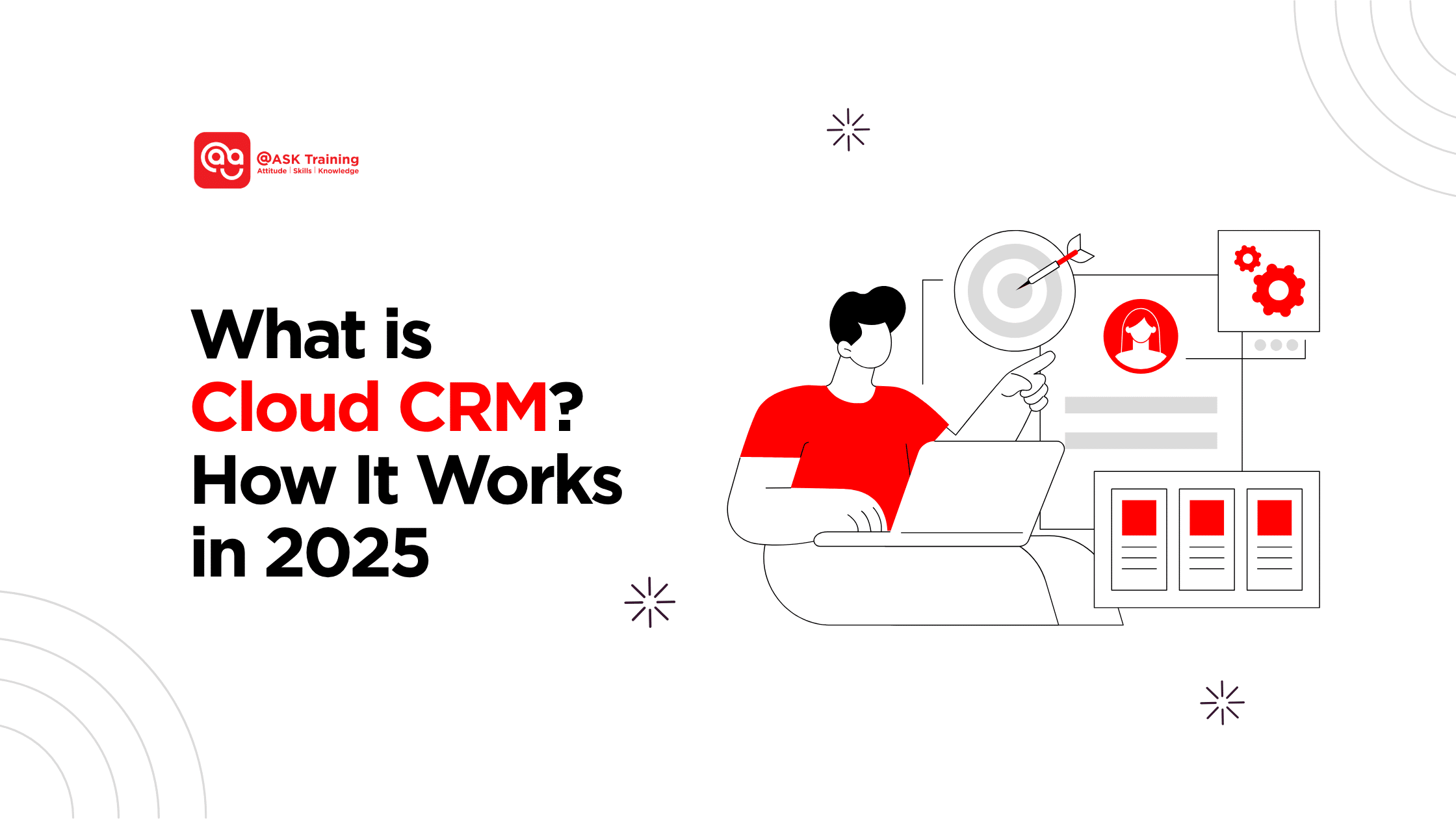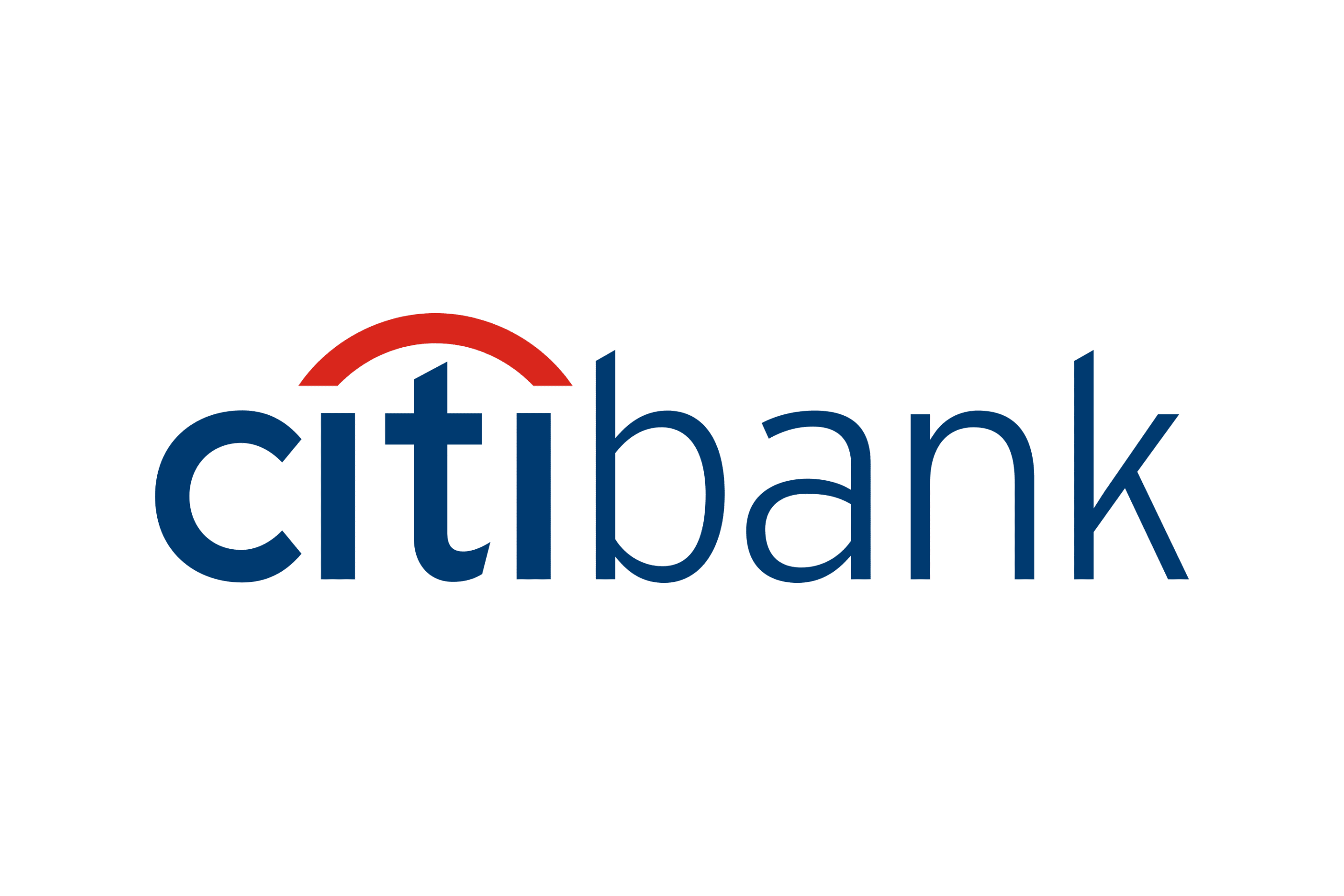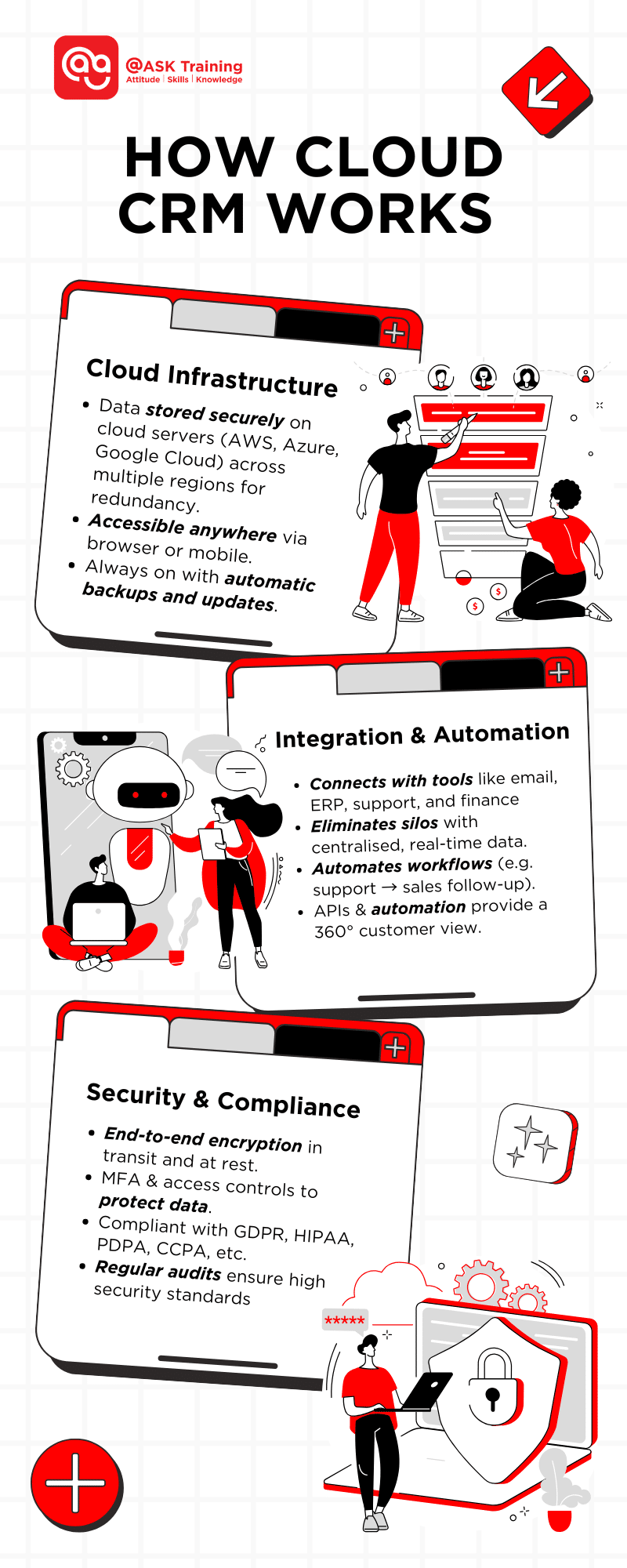
Customer relationships are the backbone of business success, and in 2025, managing them efficiently requires more than spreadsheets, disconnected databases, or outdated contact management software like Microsoft Access or ACT!.
These older systems often fall short when it comes to real-time access, integration with other business tools, and mobile functionality, making them inadequate for today’s fast-paced, digitally connected business world.
As companies continue to move away from on-premise CRM systems toward cloud-based platforms like Salesforce, HubSpot, and Zoho CRM, the way businesses manage customer relationships has fundamentally changed.
This article explores what is Cloud CRM, how it works in 2025, and why it’s an essential tool for helping businesses stay competitive and adaptable.
Let’s start with the basics: What exactly is Cloud CRM?
What is Cloud CRM?
Cloud CRM is a customer relationship management platform that operates entirely online. Unlike traditional systems installed and managed on a company’s local servers, it runs on cloud infrastructure, allowing access through any web browser or mobile app.
Over the past decade, businesses have shifted from outdated on-premise CRM systems, which often required heavy IT resources to agile, cloud-based solutions that deliver real-time access, flexibility and seamless scalability.
A Quick Look:
- Cloud-Hosted: All data and functionality are stored on remote servers managed by the CRM provider.
- Access Anywhere: Your team can securely log in from any device, anytime, keeping them connected globally.
- Subscription Model: Most Cloud-based CRM solutions operate as Software-as-a-Service (SaaS), with monthly or annual billing.
- Automatic Updates: Providers roll out new features and security patches automatically, without requiring manual IT labour.
Now that we understand what Cloud CRM is, let’s explore the core features that make it indispensable and Cloud CRM benefits that businesses gain from adoption.
Core Features and Benefits of Cloud CRM
Cloud CRM solutions in 2025 come packed with features designed to help businesses manage customer relationships more effectively in a digital-first environment.
Understanding the core features and key benefits of these systems is essential for evaluating how they can improve productivity, enhance customer engagement, and support growth.
Core Features:
- Real-time data access for timely decision-making and the ability to deliver more personalised customer experiences.
- Mobile accessibility for on-the-go sales and support teams, helping shorten sales cycles.
- Scalability to grow with your business
- Enhanced collaboration tools, including shared dashboards and chat integrations, to boost team productivity and service.
Key Benefits:
- Lower upfront costs and reduced IT overhead
- Automatic updates, keeping systems current without manual intervention
- Seamless integration with tools like email, ERP, and marketing automation
- AI-driven insights, predictive analytics, and customer sentiment tracking
Understanding these features and benefits is just the beginning, but how does Cloud CRM work and deliver these capabilities? Let’s break down the technology powering it.
How Cloud CRM Works
Cloud CRM systems are built on powerful cloud infrastructure, enabling users to access customer data, manage customer relationships, and collaborate across teams in real time.
Below, we break down the core components that make this possible and ensure that Cloud CRM platforms remain efficient, secure, and scalable.
1. Infrastructure
At the core of any Cloud CRM platform is its cloud-based infrastructure. Unlike on-premise systems that require local servers and IT maintenance, Cloud CRM stores all data on remote servers managed by service providers like Amazon Web Services (AWS), Microsoft Azure, or Google Cloud.
This approach delivers:
- Secure Data Storage: Customer data is stored in secure cloud data centres, often across multiple geographic regions for redundancy, i.e., data is distributed across various locations to prevent a single point of failure.
- Accessibility: Users can log in to the CRM through a web browser or mobile app, with role-based controls ensuring each person only sees the data relevant to their job while maintaining strict data security.
- Automatic Reliability: Cloud CRMs has built-in backup systems and maintenance-free operation to ensure continuous availability.
For businesses leveraging multiple cloud platforms, understanding interoperability is key. Learn how to connect systems seamlessly in our Multi-Cloud Interoperability: A Basic Guide.
2. Integration & Automation
One of the biggest advantages of Cloud CRM is its ability to connect with other business tools, from marketing automation platforms to sales pipelines, customer support systems, and financial software.
Why This Matters:
- Eliminates Data Silos: When customer information gets trapped in one department’s system (like sales contacts that support teams can’t access), it creates inefficiencies. Cloud CRM acts as a central hub where all teams access the same real-time data.
- Automates Cross-Department Workflows: A customer service case in Zendesk can automatically create a follow-up task in the sales team’s pipeline, ensuring nothing falls through the cracks.
Key Integration Capabilities:
- APIs (Application Programming Interfaces): Cloud CRMs offer readily available, robust APIs that allow integration with systems like marketing automation tools, ERPs (Enterprise Resource Planning systems), customer support platforms, and accounting software.
- Automation: Built-in workflow automation features help trigger follow-up emails, route leads, assign tasks, and send reminders, reducing manual effort and ensuring timely actions.
- 360-degree View: By centralising data from different systems, teams can access a complete, 360-degree view of the customer across all touchpoints, enabling more personalised interactions.
3. Security & Compliance
With customer data being one of a business’s most valuable assets, Cloud CRM providers invest heavily in security and compliance.
These platforms are designed to meet the highest standards of data protection while supporting global regulatory requirements.
- End-to-End Encryption: All data is encrypted in transit and at storage using industry-standard protocols, ensuring its security both during transfer and while stored.
- Multi-Layered Access Control: Multi-factor authentication (MFA) adds an extra layer of login protection.
- Global Compliance: Leading platforms comply with major regulations such as Singapore’s PDPA, GDPR (Europe), HIPAA (U.S. healthcare), and CCPA (California), and undergo regular audits and vulnerability assessments.
Key Considerations for Implementation:
1. Data Privacy & Compliance
- Cloud CRMs now offer robust compliance controls (GDPR, HIPAA, etc.)
- Highly regulated industries (e.g., finance, healthcare) may still require hybrid or on-premise solutions for sensitive data
2. Customisation Flexibility
- Cloud CRMs provide standardised configuration options suitable for most businesses
- On-premise solutions allow deeper customisation but require significant IT resources and cost
3. Long-Term Value Assessment
- Subscription costs may exceed on-premise over 5+ years for stable operations
- Factor in potential data migration fees and premium feature requirements
4. Update Management
- Automated cloud updates reduce IT burden but require quarterly compatibility testing
- Some legacy integrations may need adjustment after major version releases
When evaluating CRM solutions, one of the most important decisions businesses face is whether to adopt a cloud-based or on-premise system.
While both options serve the core purpose of managing customer relationships, they differ significantly in terms of infrastructure, cost, scalability, and ease of use.
Comparisons: Cloud CRM vs. On-Premise CRM
The table below breaks down the key differences to help you better understand Cloud CRM benefits compared to traditional on-premise systems.
| Feature | Cloud CRM | On-Premise CRM |
| Deployment | Hosted on the vendor’s servers, accessed via the internet | Installed locally on the company’s servers |
| Setup Cost | Low initial cost; subscription-based pricing | High upfront cost for hardware and licenses |
| Scalability | Easily scalable; add or reduce users quickly | Limited by physical infrastructure, scaling is costly |
| Accessibility | Accessible anytime, anywhere with internet | Limited to office network or via VPN |
| Maintenance | Vendor handles updates, backups, and support | Requires in-house/outsource IT team for maintenance |
| Customisation | Moderate customisation; relies on vendor’s platform | Highly customisable to specific business needs |
| Security | Vendor-managed security with robust protocols | Controlled internally; requires dedicated resources |
The comparison highlights a key takeaway: Cloud CRM excels in flexibility and cost-effectiveness, while on-premise solutions cater to organisations requiring full infrastructure control.
For most modern businesses, Cloud CRM offers:
- Lower barriers to entry with subscription-based pricing
- Effortless scalability to adapt to growth or seasonal demands
- Automatic updates that ensure access to the latest features
How are leading organisations putting this into practice? Next, we examine real-world applications across industries, demonstrating how businesses transform operations with Cloud CRM.
Practical Applications
Cloud CRM is used across industries to boost sales performance, personalise marketing, and streamline support operations.
Retail & E-commerce (e.g., Zalora, Shopee)
- Sales Intelligence: Tracks complete purchase histories to deliver hyper-personalised product recommendations
- Smart Marketing: Automates targeted campaigns based on real-time behaviour data and loyalty program integration
- Omnichannel Support: Combines chatbots, email, and social media interactions in a unified service dashboard
Financial Services (e.g., DBS, OCBC)
- High-Value Relationship Management: Tracks all advisor-client interactions across investment portfolios
- Compliant Marketing: Delivers tailored financial product offers while maintaining audit trails
- Unified Service: Provides agents with complete customer profiles for faster, compliant resolutions
Healthcare (e.g., Parkway Pantai, Raffles Medical)
- Patient Acquisition: Streamlines outreach and onboarding for new patients through automated workflows
- Targeted Engagement: Delivers location-based health promotions and appointment reminders
- Unified Care Coordination: Centralises medical records and visit history for seamless patient experiences
Education (e.g., private schools, training centres)
- Lead Management: Tracks inquiries through automated enrolment pipelines
- Alumni Relations: Sends personalised course updates and event invitations
- Centralised Support: Provides one-stop assistance for students and parents
Hospitality (e.g., Marina Bay Sands, Sentosa Resorts)
- Personalised Bookings: Tailors room upgrades and packages using guest preference data
- Loyalty Automation: Triggers targeted offers based on past stays and spending habits
- Integrated Service Hub: Manages reservations, special requests, and VIP programmes in one system
Now, let’s have a look at a few success stories of Cloud CRM in action.
Example 1: Coca-Cola Germany (Salesforce)
The Challenge:
Coca-Cola Erfrischungsgetränke AG struggled with managing over 400,000 trade and gastronomy clients in Germany across disconnected systems, leading to operational inefficiencies.
The Solution:
The company implemented Salesforce Service Cloud as a unified platform and developed custom mobile apps for field technicians.
The Results:
By implementing a dedicated app via Salesforce, the company achieved a 30–40% reduction in administrative overhead for technicians and improved sales representative efficiency by approximately 20–25%.
This has led to enhanced customer service operations. The integration allows for instant access to customer histories, efficient issue logging and tracking, and mobile accessibility for the customer service team, resulting in improved customer satisfaction and operational efficiency.
(Source: Salesforce)
Example 2: Citibank Wealth Management Cloud CRM Implementation
The Challenge:
Citibank’s Wealth Management division faced challenges with fragmented customer data scattered across multiple legacy systems.
This made it difficult for relationship managers to access a unified view of client interactions and financial profiles.
The Solution:
Citibank deployed cloud-based CRM solutions such as Salesforce CRM, developed by Aptaria that consolidated investment records, email correspondence, and transaction histories into a single platform.
The Results: Centralised Customer Data
The new system consolidated data from various sources—such as email correspondence, investment portfolios, and transaction records—into a single, unified CRM platform.
This gave relationship managers a 360-degree view of each client, enabling more informed decision-making and personalised financial recommendations tailored to individual client needs.
(Source: Aptaria)
Example 3: Zenyum’s Smile Transformation
The Challenge:
The Singapore-based clear aligner company faced rapid scaling challenges across 8 Asian markets, with disconnected systems hindering customer experience and operational efficiency.
The Solution:
Zenyum implemented Salesforce Cloud CRM to unify patient journeys, automate orthodontist partnerships, and streamline its e-commerce operations.
The Results:
The deployment reduced case resolution time by 30%, increased conversion rates by 25%, and supported 300% business growth while maintaining personalised patient care.
This case demonstrates how Cloud CRM can bridge healthcare and DTC retail workflows, a growing need in post-pandemic markets.
(Source: Salesforce)
These success stories demonstrate Cloud CRM’s transformative power across industries, from boosting operational efficiency to enabling hyper-personalised customer experiences. As businesses continue to adopt these platforms, the technology itself is evolving.
What’s next? Let’s explore how emerging innovations like AI and predictive analytics will redefine CRM capabilities in 2025 and beyond.
Future CRM Trends in 2025
As technology continues to evolve, CRM platforms are undergoing a revolutionary shift, driven by smarter technology and evolving customer expectations.
In 2025, these key trends will redefine the future of CRM and how businesses manage relationships:
AI-Driven Personalisation
Advanced AI and machine learning will deliver hyper-personalised customer experiences, predicting needs and behaviours before they arise.
Why it matters: Businesses that leverage predictive AI will see 20-30% higher customer retention by anticipating churn risks and upsell opportunities automatically.
Voice and Chat Interfaces
CRM tools will increasingly integrate with voice assistants and chatbots, making it easier to input and retrieve information.
Why it matters: Teams can capture customer insights 3x faster through natural conversations, turning casual interactions into actionable data.
Embedded Analytics
Real-time, actionable insights will be built directly into CRM interfaces, empowering faster decisions without switching tools.
Why it matters: Sales managers will cut weekly reporting time by 40% while spotting trends as they emerge—no data science degree required.
Increased Data Privacy Focus
With stricter regulations, CRM providers will enhance compliance features to help businesses manage customer data securely and transparently.
Why it matters: Automated consent management reduces compliance workload by 60% while building customer trust through transparency.
Industry-Specific CRMs
More vendors will offer tailored CRM solutions optimised for sectors like healthcare, finance, and manufacturing.
Why it matters: Manufacturers using vertical CRMs deploy systems 50% faster with built-in FDA/GMP workflows versus generic platforms.
These trends highlight the shift toward smarter, more integrated CRM systems that connect seamlessly with other business tools — supporting business growth and strengthening customer relationships.
Final Thoughts
In 2025, Cloud CRM is no longer a cutting-edge luxury — it’s a business necessity. Its ability to scale quickly, integrate seamlessly, and deliver intelligent insights makes it ideal for companies navigating a fast-changing digital world.
Recap of Key Benefits:
- Real-time customer data access empowers teams to make faster, informed decisions.
- Seamless integration – connects with tools across departments (sales, marketing, service, finance) to streamline workflows.
- Centralised platform – eliminates data silos and improves cross-team collaboration.
- Scalability and flexibility – adapts to business growth and evolving needs.
- Cost efficiency – reduce high capital expenditure (Capex) investment, leverage on operating expenditure (Opex) to achieve agility, scalability and lower upfront cost.
- Enhanced customer experience – enables personalised interactions and timely responses.
- Future readiness – supports innovation and agility in a fast-changing digital landscape.
The question is no longer whether to adopt Cloud CRM, but how quickly your team can operationalise its full potential.
Ready for the Next Move?
While implementing Cloud CRM provides immediate value, maximising its potential requires the right expertise.
@ASK Training empowers professionals and organisations through our range of IT courses. Recommended courses include:
- Cloud Computing Course: Master cloud platforms like AWS & Azure
- IT Infrastructure & Operations Course: Build scalable, secure business systems
Speak to us today and explore how our courses can transform you and your team’s skillset!
Related Courses
◆◆◆




